William "Fatty" Foulke
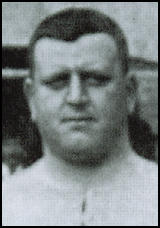
William "Fatty" Foulke was born in Dawley, Shropshire, on 12th April 1874. After leaving school he found work in the Blackwell Colliery. A talented sportsman, Foulke played in goal for the works team.
On 20th December, 1893, the Derby Daily Telegraph reported: "The feature of the game was the goalkeeping of W. Foukes (sic) of Blackwell, who certainly has the making of a first-class custodian."
The following season Foulke was sold to Sheffield United for £20 and made his debut for his new club against West Bromwich Albion on 1st September, 1894. Foulke played 29 out of 30 Football League games in his first season at the club. In doing so, he kept the brilliant Arthur Wharton out of the first-team. He only missed three first team games over the next four years. On 2nd December, 1895, Scottish Sport reported: "In Foulke, Sheffield United have a goalkeeper who will take a lot of beating. He is one of those lengthy individuals who can take a seat on the crossbar whenever he chooses, and shows little of the awkwardness usually characteristic of big men."
That season Foulke had his wage increased to £3 a week, which included a retainer wage over the summer. Foulke and his team mates were also paid a ten-shilling (50p) bonus for an away win, and five shillings for a home win or away draw. Records show that for key games the players were paid £5 for a win. At the time, the average wage of a working man was about £1. However, someone with specialist skills could earn up to £2.50 a week.
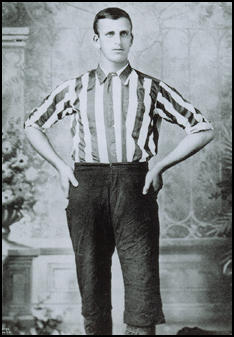
In the 1896-97 season Sheffield United were runners-up behind the double-winning Aston Villa. Foulke had conceded just 29 goals throughout the campaign and the club had easily the best defensive record in the Football League. In the home game against the champions, Foulke caused a stir by bouncing the ball as far as the halfway line. This was within the rules at the time, but as players were able to barge into other players when they had the ball, goalkeepers saw that tactic as very risky. However, Foulke was fairly confident that he would be able to regain possession of the ball. C. B. Fry, the famous cricketer, who also played football for Southampton, remarked: "Foulke is no small part of a mountain. You cannot bundle him."
Foulke won his first international cap against Wales on 29th March 1897. Although England won 4-0, surprisingly, it was the only time he played for his country. At that time John Robinson was the regular England goalkeeper. Foulke was known to be unpopular with the Football Association. As the Sheffield Daily Telegraph pointed out: "It is a pity that Foulke cannot curb the habit of pulling down the crossbar, which on Saturday ended in his breaking it in two. On form, he is well in the running for international honours, but the Selection Committee are sure to prefer a man who plays the game to one who unnecessarily violates the spirit of the rules."
In 1895 Foulke only weighed 12st 10lb but over the next few years he put on a lot of weight and was nicknamed "Fatty" or "Colossus" by the fans. He once said: "I don't mind what they call me as long as they don't call me late for my lunch." One journalist wrote that: "His ponderous girth brings no inconvenience and the manner in which he gets down to low shots explodes any idea that a superfluity of flesh is a handicap."
Foulke was 6ft 2ins tall. At the time the average height for an adult male was only 5 ft 5 ins and therefore he towered over most of the players. This can be seen in the team photographs taken at the time.
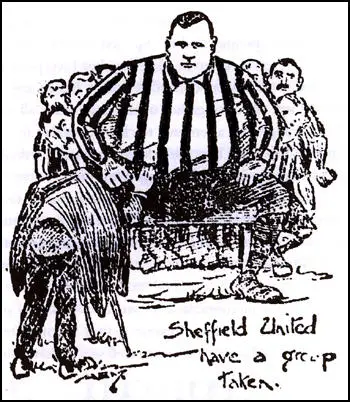
Sheffield United, led by Ernest Needham, won the First Division championship of the Football League in the 1897-1898 season. Foulke only missed one game and the team had the best defensive record in the league and one journalist described Foulke as the "greatest goalkeeper in the world". In a game against Liverpool in November, 1898, George Allan tried to intimidate Foulke. The Liverpool Post reported that "Allan charged Foulke in the goalmouth, and the big man, losing his temper, seized him by the leg and turned him upside down."
Sheffield United struggled the following year in the league but the team beat Derby County in the 1899 FA Cup Final. Foulke's form remained good. J. A. H. Catton, who was the editor of the Athletic News, commented: "His kicking from goal was as mighty as ever, and his good right hand, doubled up, banged out incoming shots with the force of a sledgehammer."
Foulke was in great form in the 1899-1900 season and once again Sheffield United had the best defensive record in the league. The club finished in second place to Aston Villa.
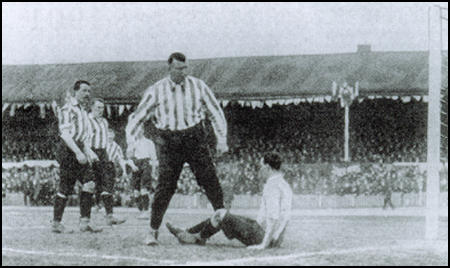
The following season Foulke was a member of the Sheffield United team that reached the 1901 FA Cup Final against Tottenham Hotspur. Foulke and the other players were on a £10 win bonus. However, the Southern League side was on a promise of £25 a man if they won the cup. The game ended in a 2-2 draw. However, Spurs won the replay 3-1. The Sheffield Independent reported: "Foulke had a lot of work to do, and cleared with great power. He had not the ghost of a chance with any of the three shots that scored, while by his skill and judgment he helped to save his side from a heavier defeat than that sustained."
In 1901 Foulke got injured and was replaced by William Bigger. He did very well and Foulke did not immediately get back in the first-team when he recovered full fitness. Once back in the side he showed good form and Bigger decided to move on to West Ham United.
Foulke now weighed twenty stone but he remained in good form and his wages were increased to £4 a week. Forwards still tried to barge Foulke over the goal-line. As the Athletic News pointed out, when this happened: "he doesn't claim a foul, but simply places that paw of his on the shoulder of the charging gentleman in a most fatherly manner, and pushed him aside with an expression of get on one side, little boy".
On another occasion he fell on Laurie Bell of Sheffield Wednesday. As he later recalled: "It was really all an accident. Just as I was reaching for a high ball Bell came at me, and the result of the collision was that we both tumbled down, but it was his bad luck to be underneath, and I could not prevent myself from falling with both knees in his back. When I saw his face I got about the worst shock I ever have had on the football field. He looked as if he was dead."
Foulke was also a talented cricketer and played for Blackwell Colliery in the Derbyshire League. One journalist joked that every time Foulke went into bat "there is an appeal against the light". He was a good bowler and a fine slip catcher. In June 1900, Foulke was selected to play for Derbyshire against Essex in the County Cricket Championship. In his first innings he scored 53 in a Derbyshire total of 508. During Essex's innings, Foulke injured his hand with a badly split finger while fielding in the slips and did not take part in the rest of the game.
When he recovered from his injury he regained his place in the team. However, he only played in three more games before deciding that cricket posed a threat to his football career. Foulke remains in the record books as the heaviest ever first-class cricketer, anywhere in the world.
Foulke's main sport was football and he was also a member of the Sheffield United team that played Southampton in the 1902 FA Cup Final. Sheffield took an early lead but Southampton scored a controversial equalizer and the game was drawn 1-1. C. B. Fry wrote in the Southern Echo: "The outstanding feature of the match was the grand goalkeeping of Foulke. he made a number of good saves, and on two or three occasions cleared the ball from what appeared impossible positions. Once, near the end, from a corner, he effected an absolute miracle with four or five men right on to him."
Foulke was furious that the equalizing goal had been given after the game he went searching for the referee. The linesman, J. T. Howcroft, described how Frederick Wall, secretary of the Football Association, tried to placate the goalkeeper: "Foulke was exasperated by the goal and claimed it was in his birthday suit outside the dressing room, and I saw F. J. Wall, secretary of the FA, pleading with him to rejoin his colleagues. But Bill was out for blood, and I shouted to Mr. Kirkham to lock his cubicle door. He didn't need telling twice. But what a sight! The thing I'll never forget is Foulke, so tremendous in size, striding along the corridor, without a stitch of clothing."
Walter Bennett was injured and could not take part in the replay. He was replaced by William Barnes on the wing. The game was only two minutes old when a massive clearing kick by Foulke reached George Hedley and Sheffield United took an early lead. Led by the outstanding Ernest Needham, Sheffield dominated play but Albert Brown managed to score a equalizer. Southampton began to apply pressure but according to the Athletic News, "Foulke was invincible". With ten minutes to go, Needham took a shot that the Southampton goalkeeper, John Robinson, could only block, and Barnes was able to hit the ball into the unguarded net. Sheffield won 2-1 and Foulke had won another medal.
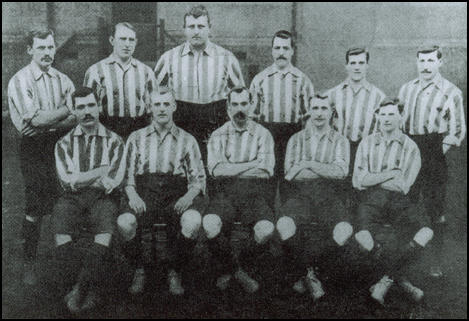
After the game, Howard Vincent, the Member of Parliament for Sheffield Central, commented that "our giant goalkeeper Foulke, with his tremendous smite and prodigious kick, the best goalkeeper football has ever seen."
Such was his fame that on 6th September 1902, Foulke was filmed by Sagar Mitchell and James Kenyon during a match against Bury. The game, which Sheffield United won 1-0, is included in the DVD Edwardian Sports.
Foulke got into trouble with the authorities for gamesmanship. He was known for pulling down on the crossbar to give a high shot a marginally smaller target. He was also an expert at time-wasting if his club was trying to hold onto a narrow lead.
In 1903 William and his wife Beatrice purchased a general store on Asline Road, Sheffield. It was a great success and later the couple ran a beer house at 363 Bramall Lane.
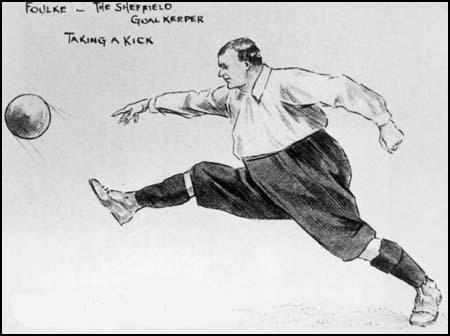
By 1903 Foulke weighed over twenty stone but he remained in good form and his wages were increased to £4 a week. Foulke could kick the ball the length of the field and it was said that he could punch the ball as far as some players could kick it. According to one contemporary account, Foulke could punch "the ball well over the half-way line." He was also described as "a leviathan at 22 stone with the agility of a bantam".
Forwards still tried to barge Foulke over the goal-line. At that time the shoulder charge remained an important part of the game. This could be used against players even if they did not have the ball. If a goalkeeper caught the ball, he could be barged over the line. This was a problem that was rarely encountered by Foulke.
As the Athletic News pointed out, when this happened: "he doesn't claim a foul, but simply places that paw of his on the shoulder of the charging gentleman in a most fatherly manner, and pushed him aside with an expression of get on one side, little boy". Another newspaper described a match against Bolton Wanderers in March, 1904: "Stokes rushed past both backs and seemed likely to dribble through, but the mountain of flesh which is posed by Foulke hove in sight, and appeared to paralyse the little Wanderer, who simply shot into the hands of the leviathan."
Foulke's increasing weight did make it more difficult to get down to fast low shots. He started receiving a lot of abuse from fans standing behind the goal. One newspaper reported that "their language is most dirty, to say nothing of the bitterness with which they taunt Foulke...it has become so bad that today a large staff of detectives has been engaged to catch the delinquents, and it will go hard with the wrongdoers."
In a game in November, 1904, Bury beat Sheffield United 7-1. The report in the Athletic News stated: "Foulke's weakness is his inability to capture low shots. He got low ones on Saturday."
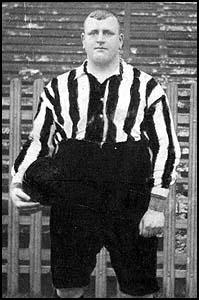
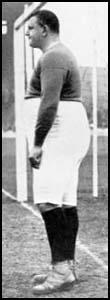
After playing in over 350 games for Sheffield United Foulke decided to leave the club when he refused to take a pay cut. In May 1905 Foulke was sold to Chelsea for a transfer fee of £50. The Sheffield Independent reported that "William Foulke, the famous giant goalkeeper, who has played a prominent part in many of the greatest deeds of the Sheffield United Football Club, has been transferred to Chelsea, a newly formed club... Foulke, who declined less than the maximum wages, had not signed for United. He is to receive the maximum from Chelsea."
Chelsea had just joined the Football League and in his first season he helped them to finish in 3rd place in the Second Division behind Bristol City and Manchester United. Foulke's form was very good and he managed to save ten penalties that season. However, he continued to put on weight. According to one report, Foulke was known to arrive early for breakfast, set for the entire Chelsea team, and eat the lot.

Foulke only played 35 games for Chelsea before moving to Bradford City. Again his transfer fee was £50. He started well and the Bradford Daily Argus reported that "there is no doubt that the mighty goalkeeper is doing a great deal in the direction of inspiring confidence in the team." This did not stop the newspaper making fun of their large goalkeeper. On 29th September, 1906, it reported that a cab horse had a narrow escape when it nearly collided with Foulke when he was crossing the Strand. Foulke was quoted as saying: "I would have jumped on the beggar's back before I would have let him come into me."
However, he now weighed over 25 stone, and was no longer as agile as he was and he retired from first-class football in November 1907. Foulke remains in the record books as the heaviest ever first-class footballer to play anywhere in the world.
In 1908 Foulke took over a larger shop in Matilda Street. He also ran The Duke public house in Sheffield. The police raided the pub on 29th September 1910. Foulke was searched and forty-five betting slips were found on his person. He replied to questions from the police that he had "no idea how they got there". Foulke was eventually found guilty of being involved in illegal betting and was fined £25 and lost his job running the public house.
William "Fatty" Foulke died on 1st May 1916. The death certificate gives "cirrhosis" as a major cause of death. There is no truth in the claim that Foulke ended his life in poverty working at a sideshow on Blackpool beach.
Primary Sources
(1) Sheffield Independent (3rd September, 1894)
Play was soon raging round the United goal, where after a bit of scuffling Taggart got an opening, and scored West Bromwich their first goal with rattling shot after ten minutes' play since the interval. The game after this became more exciting, and the play faster, but the combination was not so good on either side as at the opening...
After a corner to the United a similar advantage was conceded to the visitors."This was well dropped, and Foulke rushing out, cleared the ball cleverly, but to the surprise of everybody the referee allowed a penalty kick. That Foulke handled the ball was certain, and clearly apparent to all, but the referee held that in the scrimmage some other player had done so also. The penalty kick was taken by McLeod, but to the intense relief of the spectators the ball went outside, Foulke just touching it.
(2) Sheffield Daily Telegraph (3rd September, 1894)
In goal Foulke, who was perhaps as much watched by the crowd as any other two men in the team, did his work well and performed his part with considerable credit. He might, perhaps, have got back to his place before Taggart scored the goal for Albion, but inasmuch as he had just saved grandly, his rashness is to be excused. He was by no means lightly tried, and came off vvith undoubted honours.
(3) Scottish Sport (2nd January, 1895)
In Foulke, Sheffield United have a goalkeeper who will take a lot of beating. He is one of those lengthy individuals who can take a seat on the crossbar whenever he chooses, and shows little of the awkwardness usually characteristic of big men.
(4) Sheffield Daily Telegraph (15th February, 1897)
It is a pity that Foulke cannot curb the habit of pulling down the crossbar, which on Saturday ended in his breaking it in two. On form, he is well in the running for international honours, but the Selection Committee are sure to prefer a man who plays the game to one who unnecessarily violates the spirit of the rules.
(5) Liverpool Daily Post (29th November, 1898)
Allan charged Foulke in the goalmouth, and the big man, losing his temper, seized him by the leg and turned him upside down.
(6) Sheffield Indepedent (2nd October, 1899)
A rather curious accident occurred during the journey of the United team to Nottingham on Saturday. When passing Woodhouse Junction the curve the line caused the saloon to lurch, the train going at a good speed, and at the same moment one of the seats, on which sat Foulke, Morren, Moran, Bennett, Johnson and Howward, broke down. One of them looked as though they thought their time had come, but happily no harm was done. It was suggested that the accident was brought about by Morren having put on weight during the past few weeks.
(7) Philip Gibbons, Association Football in Victorian England (2001)
Trinidad-born Wharton had been the Amateur Athletic Association's hundred yards champion in both 1886 and 1887, as well as one of the first black professional footballers in England. However, his first team appearances were limited owing to the arrival of Willie Foulke from the Blackwell club in Derbyshire.
Foulke, who stood six feet and two inches tall, with a natural weight of thirteen stone, dominated the United goal area well into the following century, when his weight exceeded twenty stone. He played a leading part in United's success of the late 1890s as well as appearing in the English national side.
(8) J. A. H. Catton, Athletic News (3rd April, 1899)
I never saw Foulke to more advantage than on Thursday. His kicking from goal was as mighty as ever, and his good right hand, doubled up, banged out incoming shots with the force of a sledgehammer.
(9) Sheffield Independent (29th April, 1901)
Foulke had a lot of work to do, and cleared with great power. He had not the ghost of a chance with any of the three shots that scored, while by his skill and judgment he helped to save his side from a heavier defeat than that sustained.
(10) Article about William Foulke in the programme of his benefit match (21st October, 1901)
This afternoon we give a benefit to one of our Most popular players in William Foulke, our stalwart goalkeeper... He is one of those men whom we delight to honour, has been in the forefront of all our great success - perhaps in view of his position on the field, it would be more exact to say in the background, and has drawn to himself in the course of his association with our club much notice from the powers. He has had several honours given him, though the greatest honour of all, the cap for England against Scotland, has been denied him. We are rather inclined to think that in this he has hardly had fair treatment for of the general quality of his work between the sticks there can hardly be a difference of opinion. It has often been said that he is poor at low shots yet those who say so find it hard to substantiate this argument, and to our mind he stops all sorts, and has done splendidly even against the fastest shots on the ground. He has been faced by the finest sharpshooters in both this country and Scotland, has had pick of the forwards in both Leagues to face, and yet has always done well.
Of course, a man of his build - he is not called 'Little Willie' for nothing - is always prone to accident on hard ground and more than once this coupled with the pleasant pastime, which some forwards have of administering a skilfully concealed parting hack when the referee's back is the other way, has led to his leg in real bodily pain at times when doing duty. For all that he has never flinched, and we have seen him when actually unfit for work virtually standing on one leg, and yet fisting out shots of every description and keeping his citadel intact. To our mind Foulke is the personification of pluck and courage.
(11) C. B. Fry, Southern Echo (21st April, 1902)
The outstanding feature of the match was the grand goalkeeping of Foulke. he made a number of good saves, and on two or three occasions cleared the ball from what appeared impossible positions. Once, near the end, from a corner, he effected an absolute miracle with four or five men right on to him.
(12) J. A. H. Catton, The Story of Association Football (1926)
I have been scribbling about footballers from the days when I had some hair until now a comb is an encumbrance and scanty locks are silvered o'er with the toll of years. Seldom have players complained to me about what I have thought fit to set down.
Two instances to the contrary come to mind. When Sheffield United and Southampton met in the Final Tie for The Cup at the Crystal Palace in 1902 there was a curious incident, for when the second half was advanced and the United were leading by a goal scored by Common, Edgar Chadwick broke away and made a pass to Harry Wood, the father of Arthur Wood, who kept goal for Clapton Orient. The famous old Wolverhampton forward went on and scored. Thus the match was drawn-most unexpectedly.
At that time I had left the Press Box and was sitting on the pavilion near Mr. G.S. Sherrington, one of the vice-presidents of the Football Association, and Mr. P.A. Timbs, who was then on the Council. They turned and said that the goal was offside, but Tom Kirkham, of Burslem, the referee, gave a goal. I said that the ball grazed the knickers of Peter Boyle, the Sheffield United back, in transit. Strangely enough, John T. Howcroft, who was the linesman on the opposite side of the field to the grandstand, thought so, too.
The following Saturday the Final was replayed at the Crystal Palace, and I went down to the dressing cubicles in the pavilion to ascertain the teams before they went out. Peter Boyle saw me and most indignantly denied that the ball ever touched him, and threatened to do all manner of things with my poor body. No doubt he was annoyed and at the moment heated.
I felt the truth of what Lafcadio Hearn once said: "What is wanted in a time of embarrassment and danger is a good head not a strong arm." So I temporised about optical delusions and mistakes to which all men are subject.
Then there appeared in front of me a naked giant-one William Foulke, the Sheffield goalkeeper, who stood all six feet two inches and pulled down the scale at twenty stones. If ever man deserved the name of The Mountain he did. Foulke was good tempered and sought to quell the storm by humour. So he put himself in fighting position and said: "Come on, lad. You're just about my weight" - and I was a miserable five feet and under eleven stones. I could have laughed, but Boyle's brow was menacing.
The situation was far from pleasant, but Ernest Needham opened the door of his cubicle and pulled me inside. "Nudger" Needham surprised me by saying that I had left the Press Box and never saw the goal. I explained, and my peril passed. There is no doubt that I was mistaken-but two of the officials were the same.
(13) Graham Phythian, Colossus: The True Story of William Foulke (2005)
As the teams made their way from the pitch, a Southampton fan decided to vent his frustration on Needham, hitting the Sheffielder in the face. Perhaps he chose Needham because of the half-back's small stature. If it were so, it were a grievous fault. Nobody present - with the single obvious exception - could have been a more redoubtable opponent in such a confrontation than hard-as-nails Needham. Normally the soul of diplomacy, the United captain retaliated with a left-right combination that wouldn't have disgraced Bob Fitzsimmons. At this point the spectator, concluding it might be a good idea to make himself scarce, turned and ran - into the arms of a couple of policemen. The next day back in Sheffield there was a rumour that it was Foulke who had hit back. But as the Monday's Sheffield Telegraph wryly connnented: "The assailant may be glad it was only Needham."
Foulke's anger at Wood's last-minute goal was still smouldering as the teams reached the dressing rooms. Were the moneyed southerners about to steal a march as they had done the previous year? In broad terms, the South equalled London and the establishment. Jack Robinson, the Southampton goalie, was the usual choice for international honours, getting the nod over Foulke every time. And there was right-back C.B. Fry, landed gent and lauded amateur, the Corinthian whose well-bred insults directed at the professionals and the proles in football were well known. All these ingredients no doubt added to the cocktail of resentment simmering away inside the big man.
(14) David Randall, Great Sporting Eccentrics (1985)
At the end of the 1902 cup final he left the field huffing and puffing with indignation at a decision by Mr Tom Kirkham which allowed Southampton to equalise and earn a replay. In the dressing room Foulke got more and more worked up so that by the time he was stripped, his entire mass was wobbling with rage. With a great roar Foulke swore vengeance on the little official and went looking for him. Fortunately Kirkham saw him first and he dived for cover into a nearby boot cupboard. But Foulke was not to be thwarted. He seized the cupboard door and began trying to wrench it from its hinges. It was in this rather compromising position that the naked goalkeeper was discovered by the secretary of the Football Association and several other worthies. They somehow managed to soothe the savage Foulke and shepherd him gently back to his dressing room.
(15) Athletic News (7th March, 1904)
Stokes rushed past both backs and seemed likely to dribble through, but the mountain of flesh which is posed by Foulke hove in sight, and appeared to paralyse the little Wanderer, who simply shot into the hands of the leviathan.
(16) The Men Who Made Football (1904)
Perhaps the most talked of player in the world - a leviathan at 22 stone with the agility of a bantam. 'The cheeriest of companions, brims over with good humour. His ponderous girth brings no inconvenience and the manner in which he gets down to low shots explodes any idea that a superfluity of flesh is a handicap. At Chelsea, he has amused the crowd by punching the ball from his goal to well over the halfway line!
(17) In an interview in the London Evening News in 1913, William Foulke described an incident with Larry Bell of Sheffield Wednesday in a game that took place in the 1897-98 season.
It was really all an accident. Just as I was reaching for a high ball Bell came at me, and the result of the collision was that we both tumbled down, but it was his bad luck to be underneath, and I could not prevent myself from falling with both knees in his back. When I saw his face I got about the worst shock I ever have had on the football field. He looked as if he was dead."
(18) The Sheffield Independent (15th May, 1905)
William Foulke, the famous giant goalkeeper, who has played a prominent part in many of the greatest deeds of the Sheffield United Football Club, has been transferred to Chelsea, a newly formed club... Foulke, who declined less than the maximum wages, had not signed for United. He is to receive the maximum from Chelsea.
(19) William Foulke, London Evening News (6th May, 1916)
As the biggest man who ever played football, I have naturally had a few stories told about me, and I should just like to say that some of them are stories.You may have heard that there was a very great rivalry between the old Liverpool centre forward Allan and myself, that prior to one match we breathed fire and slaughter at each other, that at last he made a rush at me as I was saving a shot, and that I dropped the ball, caught him by the middle, turned him clean over in a twinkling, and stood him on his head, giving him such a shock that he never played again.
Well, the story is one which might be described as a "bit of each". In reality, Allan and I were quite good friends off the field. On it we were opponents, of course, and there's no doubt he was ready to give chaff for chaff with me. What actually happened on the occasion referred to was that Allan (a big strong chap, mind you) once bore down on me with all his weight when I was saving.
I bent forward to protect myself, and Allan, striking my shoulder, flew right over me and fell heavily. He had a shaking up, I admit, but quite the worst thing about the whole business was that the referee gave a penalty against us and it cost Sheffield United the match.
There is another story about an Everton forward, Bell, who had threatened me. They will tell you how I got the best of him by bowling him over, then rubbing his nose in the mud, and picking him up with one hand to give him to his trainer to be cared for.
It was really all an accident. Just as I was reaching for a high ball Bell came at me, and the result of the collision was that we both tumbled down, but it was his bad luck to be underneath, and I could not prevent myself front falling with both knees in his back.
At that time I weighed about twenty-two-and-a-half stone, and I knew I must have hurt him, but when I saw his face I got about the worst shock I ever have had on the football field. He looked as if he was dead. I picked him up in my arms as tenderly as a baby, and all I could say was "Oh dear! Oh dear!' But I am happy to say the affair was not so serious as it looked, and the Everton man came round all right.
Nobody is fonder of fun or "devilment" than I am, but nobody who knows me would suggest that I would try to hurt an opponent - though a few of them have hurt me in my time! Talking of fun, I don't mind admitting that I think I had as much as most men during my football career. To my mind almost the best time for a joke is after the team has lost.
When we'd won I was as ready to go to sleep in the railway carriage as anybody. All was peace and comfort then! But when we'd lost I made it my business to be a clown. Once when we were very disappointed I begged some black stuff from the engine driver and rubbed it over my face. There I was sitting on the table and playing some silly game, with all the team round me, laughing like kiddies at a Punch and Judy show, when some grumpy committeeman looked in. Ask the old team, the boys who won the League Championship once and the Cup twice, if a bit of "Little Willie's" foolery didn't help to chirp them up before a tough match.
I sometimes had a hard job to keep my temper on the field, though.You might have thought that forwards would steer clear of such a big chap. Some did, but others seemed to get wild when they couldn't get the ball into goal, and I suffered a lot through kicks administered when the referee wasn't looking.
Although it is more than five years since I gave up playing football, I can still show patches of bruising six inches long on my legs. There is one scar across thee shin which looks as if it will never fairly heal up.
(20) London Evening News (6th May, 1916)
I have just seen that William Foulke, the giant goalkeeper, has died in a nursing home at Sheffield... For such a huge man his quickness was phenomenal, and only equalled by his strength, for he could punch the ball to the halfway line. His celerity of movement, coupled with his reach, and his immense expanse, made him a difficult man to beat... Foulke was a thoroughly good-tempered man, who had the spirit of a true sportsman. He had a real love for football, and watched matches for years after he gave up playing.
(21) Graham Phythian, Colossus: The True Story of William Foulke (2005)
Now is a good time to deal with that apocryphal tale that has stubbornly attached itself to William's retirement vears: that he ended them in poverty as a sad sideshow on Blackpool beach, earning a pittance saving shots from holidaymakers at a penny a go.
The apparent primary evidence for this stems from the final paragraph of a hastily composed obituary in the Sheffield Daily Telegraph the morning after his death. As far as contemporary sources go, the story appears absolutely nowhere else. There's nothing - neither photo nor press snippet nor oral recollection - from the Blackpool local history archives. And there's clear evidence from the Sheffield Directories of 1899-1916 that Willie Foulke never moved from that city in all those years. He was a local hero and owner of a thriving corner shop: why would he need to grub for pennies at a Lancashire seaside resort? Was the pressure to meet the morning Telegraph deadline the reason for the error? If so, an apology and correction later in the week would have been in order, but nothing of the sort appeared. The fuller obituary in the Telegraph sports special the following Saturday night makes no mention of Blackpool.

